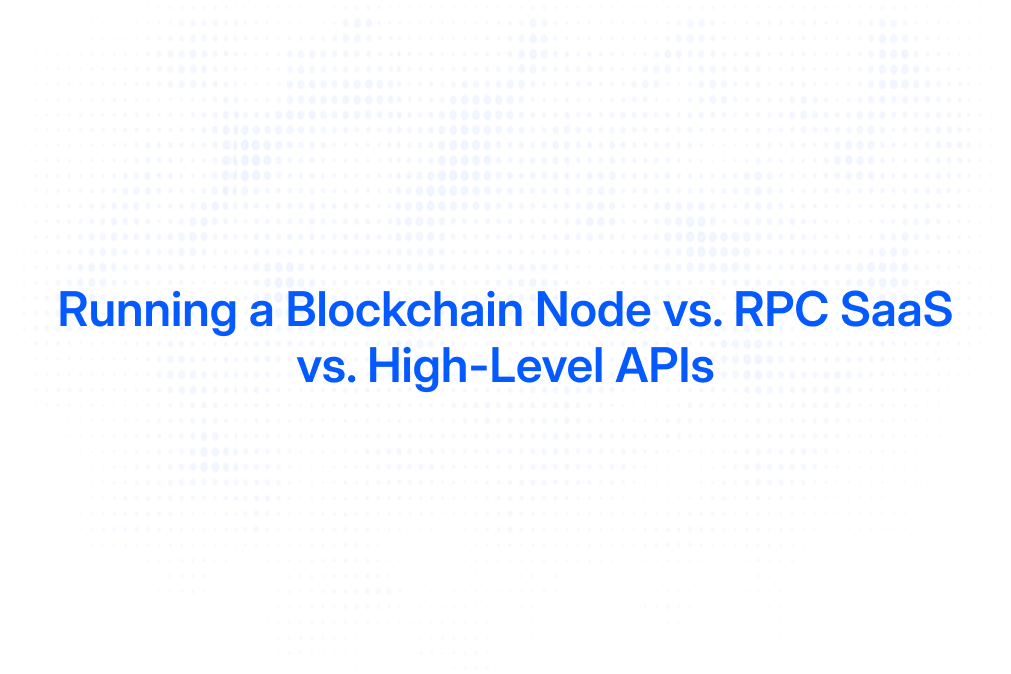Uniblock vs Alchemy: RPC Routing Compared
In the rapidly evolving Web3 ecosystem, reliable and efficient Remote Procedure Call (RPC) routing is critical for blockchain applications. Developers and businesses rely heavily on RPC providers to connect their apps to blockchain networks, ensuring seamless data exchange and transaction processing. Two prominent names in this space are Uniblock and Alchemy, both offering RPC routing solutions with distinct approaches and capabilities. This article provides a comprehensive comparison of Uniblock and Alchemy, focusing on their RPC routing technologies, reliability, cost-effectiveness, and overall impact on Web3 infrastructure.
Understanding RPC Routing in Blockchain
Before diving into the comparison, it's essential to understand what RPC routing entails in the context of blockchain. RPC, or Remote Procedure Call, is a protocol that allows a program to request services from software located on another computer within a network. In blockchain, RPC endpoints act as gateways for decentralized applications (dApps) to interact with blockchain nodes, enabling tasks such as querying blockchain data or submitting transactions.
RPC routing refers to the method of directing these requests through multiple RPC providers or endpoints to optimize for factors like latency, uptime, and cost. Effective RPC routing is vital to reduce downtime, improve response times, and maintain a resilient connection to blockchain networks.
Uniblock’s Approach to RPC Routing
Multi-Provider Aggregation for Enhanced Reliability
Uniblock distinguishes itself by offering a multi-provider RPC routing solution, aggregating several RPC endpoints into a unified access point. This approach ensures redundancy and failover capabilities, meaning if one provider experiences downtime or latency spikes, traffic is automatically rerouted to healthier endpoints. This multi-provider strategy significantly reduces the risk of RPC outages, a common pain point in blockchain infrastructure.
By leveraging multiple RPC providers, Uniblock also enables developers to benefit from the strengths of various networks, balancing load and optimizing performance dynamically. This method aligns with the emerging trend of multi-RPC provider solutions, which outperform single-provider setups by mitigating single points of failure and improving overall reliability.
Cost Optimization Through Intelligent Routing
Another advantage of Uniblock’s platform is its focus on cost efficiency. The system intelligently routes requests to the most cost-effective RPC providers without compromising on speed or reliability. This dynamic routing helps startups and enterprises reduce RPC expenses by up to 40%, a crucial factor given the high operational costs associated with blockchain API calls.
Uniblock’s routing infrastructure also supports scaling to millions of API calls, making it suitable for projects anticipating rapid growth or high transaction volumes. The platform’s ability to orchestrate multiple providers behind a single endpoint simplifies integration and reduces developer overhead.
Alchemy’s RPC Routing Capabilities
Robust Infrastructure with Developer-Centric Tools
Alchemy has established itself as a leading RPC provider, known for its robust infrastructure and comprehensive developer tools. It offers a high-performance RPC endpoint service with built-in analytics, debugging, and monitoring features that cater specifically to developer needs. These tools provide valuable insights into API usage, error rates, and transaction statuses, helping teams optimize their applications effectively.
Alchemy’s RPC routing focuses on delivering a reliable and scalable connection to Ethereum and other supported blockchains. While primarily a single-provider solution, Alchemy has invested heavily in infrastructure redundancy and failover mechanisms to minimize downtime.
Limitations of Single-Provider Dependency
Despite its strengths, Alchemy’s single-provider model presents inherent risks. Relying on one RPC provider can lead to outages or degraded performance if that provider encounters issues. This risk is especially critical for mission-critical applications where downtime translates directly into lost revenue or user trust.
Moreover, single-provider setups may face challenges in cost optimization since there is limited flexibility to route requests based on pricing or regional latency. While Alchemy offers competitive pricing and performance, the lack of multi-provider routing means users cannot leverage the benefits of RPC redundancy or dynamic cost balancing.
Comparing Key Features: Uniblock vs Alchemy
Reliability and Uptime
Uniblock’s multi-provider routing inherently provides higher reliability through automatic failover and load balancing across multiple RPC endpoints. This design minimizes the risk of downtime and ensures consistent performance even during provider-specific outages.
Alchemy, while robust, depends on its own infrastructure and redundancy measures. Although it maintains high uptime, the single-provider nature means that any systemic issue on Alchemy’s side could impact all users simultaneously.
Performance and Latency
Both platforms prioritize low latency and fast response times. Uniblock’s multi-region RPC routing can reduce latency by directing requests to geographically optimal endpoints, enhancing user experience globally. Alchemy’s infrastructure is optimized for speed, with data centers strategically located to serve major blockchain networks efficiently.
However, Uniblock’s ability to dynamically select the best-performing provider at any given moment gives it an edge in maintaining consistently low latency under varying network conditions.
Cost Efficiency
Uniblock’s intelligent routing offers significant cost savings by balancing requests across providers based on pricing models. This flexibility is particularly beneficial for startups and projects with tight budgets, enabling them to scale without incurring prohibitive RPC costs.
Alchemy’s pricing is transparent and competitive but lacks the dynamic cost optimization that multi-provider routing enables. Users pay for the service provided by Alchemy alone, which may not always be the cheapest option available.
Developer Experience and Ecosystem
Alchemy excels in providing a rich developer experience with advanced monitoring, debugging tools, and detailed analytics. These features help developers troubleshoot issues quickly and optimize their applications effectively.
Uniblock, while newer in the market, offers a streamlined integration process by consolidating multiple RPC providers into a single endpoint. This simplicity reduces the complexity of managing multiple API keys and endpoints, allowing developers to focus on building their applications.
Why Multi-Provider RPC Routing is the Future
The blockchain ecosystem is becoming increasingly complex, with growing demands for scalability, reliability, and cost-effectiveness. Multi-provider RPC routing, as championed by Uniblock, addresses these challenges by combining redundancy, failover, and load balancing into one seamless solution.
Using multiple RPC providers reduces the risk of single points of failure, a critical consideration given the high cost and impact of RPC downtime on blockchain projects. It also enables better geographic distribution, lowering latency and improving user experience worldwide.
Furthermore, multi-provider routing supports cost optimization strategies that single-provider models cannot match, helping projects manage budgets more effectively while scaling their operations.
Conclusion: Choosing Between Uniblock and Alchemy
Both Uniblock and Alchemy offer compelling RPC routing solutions tailored to different needs within the Web3 space. Alchemy is a mature, developer-friendly platform with a strong focus on infrastructure robustness and tooling, making it an excellent choice for teams prioritizing ease of use and deep analytics.
Uniblock’s multi-provider RPC routing, on the other hand, offers superior reliability, cost savings, and scalability through its aggregation model. It is particularly well-suited for projects that require high uptime, dynamic routing, and the flexibility to optimize costs across providers.
Ultimately, the choice depends on the specific requirements of your blockchain application. For projects where redundancy and cost optimization are paramount, Uniblock presents a forward-looking solution aligned with the future of Web3 infrastructure. For those seeking a comprehensive developer ecosystem with proven performance, Alchemy remains a strong contender.
As the Web3 landscape continues to mature, adopting advanced RPC routing strategies like those offered by Uniblock and Alchemy will be essential to building resilient, efficient, and scalable blockchain applications.
Ready to enhance your Web3 development experience? Join over 2,000 developers who are already leveraging Uniblock's orchestration platform to connect seamlessly to blockchain data. With Uniblock, you can enjoy maximized uptime, reduced latency, and significant savings on infrastructure costs across 100+ chains. Say goodbye to vendor lock-in and scale your project with confidence. Start building with Uniblock today and remove the manual hassle of managing decentralized infrastructure.
.svg)


.png)



